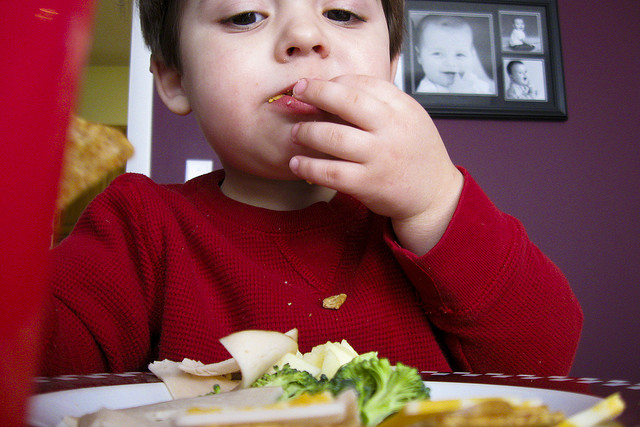
I can only imagine how tough it is being a mom. There’s the cleaning, the activities, the school, the laundry, the shopping, the daycare, the diapers, the nightmares, and the list goes on and on. Sometimes, you just don’t have room in your head for one more concern.
How about a shuffling of your priorities? According to science, what kids eat in their early years can have a long-lasting effect on their health-and may actually influence their odds of getting cancer later in life. If you’re feeling just too wrung out to come up with nutritious meals, consider leaving the house a little messier, letting the toys lie scattered about, or cutting back on an activity or two, as helping your children eat healthy may be one of the most important things you can do for their future.
Scientists have long known that eating a nutritious diet, exercising regularly and maintaining a healthy weight can help prevent many types of cancers. Recent research has shown, however, that four in five children aren’t getting the recommended five servings of fruits and vegetables a day, and a leading cancer charity has warned that this could lead to an increased risk of cancer later in life. Add to that the current childhood obesity epidemic-with obesity also being a cancer risk-and you have real reason for concern.
Though this study was conducted in the United Kingdom, the U.S. Centers for Disease Control and Prevention (CDC) has shown similar statistics for American children. In California, for instance, only one-fifth of school children meet the daily recommendations for vegetable consumption, and fewer than that for fruits. Meanwhile, half their calories come from added fat and sugar! In fact, one in three children born in the year 2000 will develop diabetes in their lifetime.
“The fact that only a fifth of children are getting enough fruit and vegetables is a concern,” said Nathalie Winn, nutritionist for the World Cancer research Fund, “because it is important that we encourage children to get into healthy habits as early in life as possible.”
It’s true that what children eat in their first 4-5 years can great effect their eating habits for years to come. If they get used to sugary drinks, high-fat cakes and cookies, and a regular diet of low-nutrition snacks and desserts, they’ll establish a taste for these things that will become solidified habits tough to break when they become adults.
“Begin early-in infancy-and each day, with meal choice, show kids that eating healthy is just what we do,” says Jatinder Bhatia, MBBS, professor and chief of the section of neonatology at the Department of Pediatrics at the Medical College of Georgia. “Kids who are offered a variety of fruits and vegetables every day are going to be more likely to choose these items when they are away from home.”
What if your child is a picky eater? Here are several recommendations for getting your kids to eat healthy. It is possible!
- Don’t give up-continue to offer fruits and vegetables at every meal and snack. Give the child a choice, but make sure both choices are healthy options.
- Teach by example-eat healthy foods yourself. Your child will copy what you do more than what you say.
- Set regular meal times. Research has shown that the decline in sit-down family meals has contributed to the decline in the quality of children’s diets. Sit down with your child to eat for three meals a day. You can create snack times as well, but be sure they’re at the table. Kids who run around the house with food in their mouths tend to learn to nibble constantly, which can contribute to obesity. “Family table time provides an opportunity to build strong parent-child connectedness,” says the Children’s Nutrition Collection, “establish regular meal schedules, serve and introduce new nutritious foods, and serve as a positive role model for healthy eating habits.”
- Turn off the television. Studies have found that children who eat in front of the TV consume more food and more unhealthy foods than those who don’t watch TV during meals.
- Don’t use food as a reward. Many parents give children cookies or candy to reward good behavior. This encourages kids to revere these foods as the “best” foods. Consider using activities for rewards instead-extra play time, a trip to the zoo, a family game, or “child’s choice” of an evening activity.
How do you get your kids to eat healthy? Please share your tips.
Photo courtesy timsamoff via freedigitalphotos.net.

